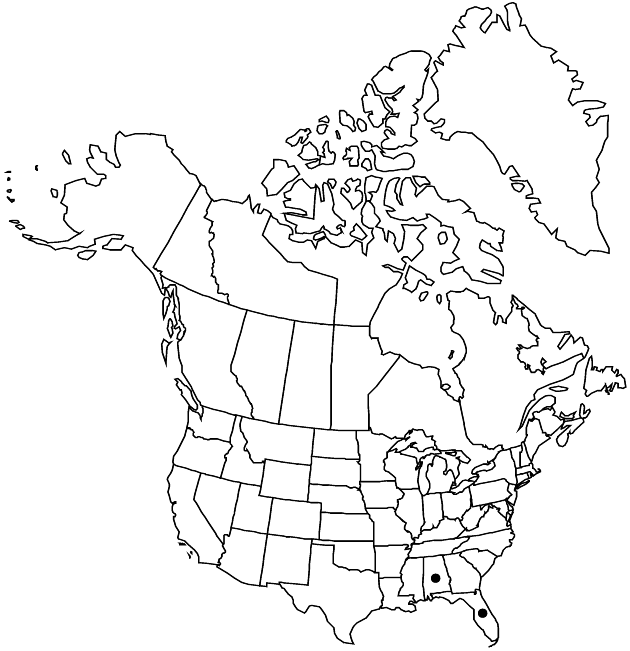Difference between revisions of "Chrysopsis gossypina subsp. cruiseana"
Canad. J. Bot. 58: 148. 1980.
FNA>Volume Importer |
FNA>Volume Importer |
||
| Line 27: | Line 27: | ||
|elevation=0–10 m | |elevation=0–10 m | ||
|distribution=Ala.;Fla. | |distribution=Ala.;Fla. | ||
| − | |discussion=<p>Subspecies cruiseana is found in the western panhandle of Florida and adjacent Alabama, on the Gulf coast and barrier islands. Its habitat is threatened through destruction of the coastal dune systems. Putative subsp. cruiseana plants seen from South Carolina are atypical forms of subsp. gossypina forma trichophylla with small leaves and slightly glandular phyllaries; they do have the prostrate habit and general appearance of typical subsp. cruiseana. Hybridization with subsp. hyssopifolia occurs in scattered locations where barrier islands contact the mainland in Florida. Hybrids with C. godfreyi have been collected in Fort Walton Beach, Florida (J. C. Semple and C. C. Chinnappa 1980).</p> | + | |discussion=<p>Subspecies cruiseana is found in the western panhandle of Florida and adjacent Alabama, on the Gulf coast and barrier islands. Its habitat is threatened through destruction of the coastal dune systems. Putative <i></i>subsp.<i> cruiseana</i> plants seen from South Carolina are atypical forms of <i></i>subsp.<i> gossypina</i> forma trichophylla with small leaves and slightly glandular phyllaries; they do have the prostrate habit and general appearance of typical <i></i>subsp.<i> cruiseana</i>. Hybridization with <i></i>subsp.<i> hyssopifolia</i> occurs in scattered locations where barrier islands contact the mainland in Florida. Hybrids with <i>C. godfreyi</i> have been collected in Fort Walton Beach, Florida (J. C. Semple and C. C. Chinnappa 1980).</p> |
|tables= | |tables= | ||
|references= | |references= | ||
| Line 51: | Line 51: | ||
|publication year=1980 | |publication year=1980 | ||
|special status= | |special status= | ||
| − | |source xml=https://jpend@bitbucket.org/aafc-mbb/fna-data-curation.git/src/ | + | |source xml=https://jpend@bitbucket.org/aafc-mbb/fna-data-curation.git/src/8f726806613d60c220dc4493de13607dd3150896/coarse_grained_fna_xml/V19-20-21/V20_490.xml |
|tribe=Asteraceae tribe Astereae | |tribe=Asteraceae tribe Astereae | ||
|genus=Chrysopsis | |genus=Chrysopsis | ||
Revision as of 16:24, 18 September 2019
Perennials, 10–50 cm. Stems 1–80 (older plants), procumbent, branched proximally. Leaves: mid and distal cauline numerous, crowded; blades linear-elliptic to oblong, margins not ciliate, glabrous. Heads in compact umbelliform arrays. Phyllaries appressed, glabrate or glabrous, a few stipitate glands proximally on outer series. 2n = 18.
Phenology: Flowering Oct–Dec.
Habitat: Sand dunes
Elevation: 0–10 m
Discussion
Subspecies cruiseana is found in the western panhandle of Florida and adjacent Alabama, on the Gulf coast and barrier islands. Its habitat is threatened through destruction of the coastal dune systems. Putative subsp. cruiseana plants seen from South Carolina are atypical forms of subsp. gossypina forma trichophylla with small leaves and slightly glandular phyllaries; they do have the prostrate habit and general appearance of typical subsp. cruiseana. Hybridization with subsp. hyssopifolia occurs in scattered locations where barrier islands contact the mainland in Florida. Hybrids with C. godfreyi have been collected in Fort Walton Beach, Florida (J. C. Semple and C. C. Chinnappa 1980).
Selected References
None.
